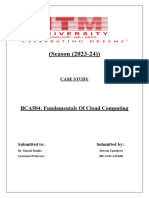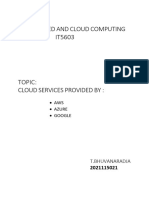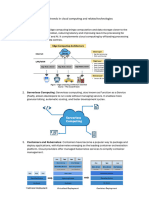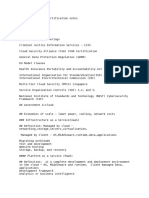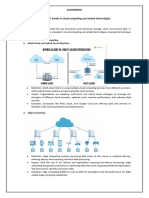0% found this document useful (0 votes)
18 views5 pagesAssignment 2cc
The document compares cloud services offered by Amazon Web Services (AWS), Google Cloud Platform (GCP), and Microsoft Azure, highlighting their key features, benefits, and use cases for organizations. It discusses how these services enhance business operations through cost savings, security, remote collaboration, and AI-driven analytics. Additionally, it provides a comparison of their strengths in various areas such as AI/ML services, serverless computing, and global reach.
Uploaded by
mhaseebmehmood47Copyright
© © All Rights Reserved
We take content rights seriously. If you suspect this is your content, claim it here.
Available Formats
Download as DOCX, PDF, TXT or read online on Scribd
0% found this document useful (0 votes)
18 views5 pagesAssignment 2cc
The document compares cloud services offered by Amazon Web Services (AWS), Google Cloud Platform (GCP), and Microsoft Azure, highlighting their key features, benefits, and use cases for organizations. It discusses how these services enhance business operations through cost savings, security, remote collaboration, and AI-driven analytics. Additionally, it provides a comparison of their strengths in various areas such as AI/ML services, serverless computing, and global reach.
Uploaded by
mhaseebmehmood47Copyright
© © All Rights Reserved
We take content rights seriously. If you suspect this is your content, claim it here.
Available Formats
Download as DOCX, PDF, TXT or read online on Scribd
/ 5

